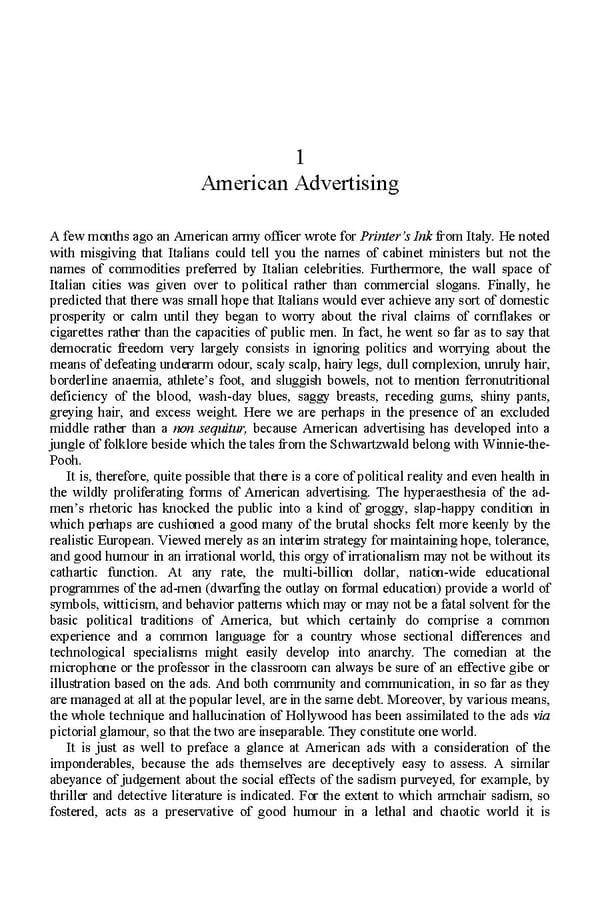1 American Advertising A few months ago an American army officer wrote for Printer’s Ink from Italy. He noted with misgiving that Italians could tell you the names of cabinet ministers but not the names of commodities preferred by Italian celebrities. Furthermore, the wall space of Italian cities was given over to political rather than commercial slogans. Finally, he predicted that there was small hope that Italians would ever achieve any sort of domestic prosperity or calm until they began to worry about the rival claims of cornflakes or cigarettes rather than the capacities of public men. In fact, he went so far as to say that democratic freedom very largely consists in ignoring politics and worrying about the means of defeating underarm odour, scaly scalp, hairy legs, dull complexion, unruly hair, borderline anaemia, athlete’s foot, and sluggish bowels, not to mention ferronutritional deficiency of the blood, wash-day blues, saggy breasts, receding gums, shiny pants, greying hair, and excess weight. Here we are perhaps in the presence of an excluded middle rather than a non sequitur, because American advertising has developed into a jungle of folklore beside which the tales from the Schwartzwald belong with Winnie-the- Pooh. It is, therefore, quite possible that there is a core of political reality and even health in the wildly proliferating forms of American advertising. The hyperaesthesia of the ad- men’s rhetoric has knocked the public into a kind of groggy, slap-happy condition in which perhaps are cushioned a good many of the brutal shocks felt more keenly by the realistic European. Viewed merely as an interim strategy for maintaining hope, tolerance, and good humour in an irrational world, this orgy of irrationalism may not be without its cathartic function. At any rate, the multi-billion dollar, nation-wide educational programmes of the ad-men (dwarfing the outlay on formal education) provide a world of symbols, witticism, and behavior patterns which may or may not be a fatal solvent for the basic political traditions of America, but which certainly do comprise a common experience and a common language for a country whose sectional differences and technological specialisms might easily develop into anarchy. The comedian at the microphone or the professor in the classroom can always be sure of an effective gibe or illustration based on the ads. And both community and communication, in so far as they are managed at all at the popular level, are in the same debt. Moreover, by various means, the whole technique and hallucination of Hollywood has been assimilated to the ads via pictorial glamour, so that the two are inseparable. They constitute one world. It is just as well to preface a glance at American ads with a consideration of the imponderables, because the ads themselves are deceptively easy to assess. A similar abeyance of judgement about the social effects of the sadism purveyed, for example, by thriller and detective literature is indicated. For the extent to which armchair sadism, so fostered, acts as a preservative of good humour in a lethal and chaotic world it is
 Essential McLuhan Page 17 Page 19
Essential McLuhan Page 17 Page 19